travel content
Travel Guide: Celebrating Lunar New Year in Asia
Discover the best places to visit in Asia during the Lunar New Year.
The Lunar New Year is a 15-day-long festival and is one of the most important festivals for the Asian community. Also known as the Spring Festival in most places, the Lunar New Year typically happens sometime between end-January and mid-February. This year, the Lunar New Year starts on 22 January 2023.
While mostly celebrated across Asia, the duration of the festivities and holidays differ largely from country to country. If you're planning a trip to Asia during the Lunar New Year, use our guide to make the most of your trip. We’ll talk about Lunar New Year’s celebrations in the following Asian countries:
- Japan
- Singapore
- Korea
- Vietnam
- Thailand
Japan
Since the adoption of the Gregorian calendar in 1873, the Lunar New Year has not been an official holiday in Japan. This means that it is still mostly business-as-usual in Japan over the Lunar New Year holidays, and we can expect to still see shops and restaurants open.
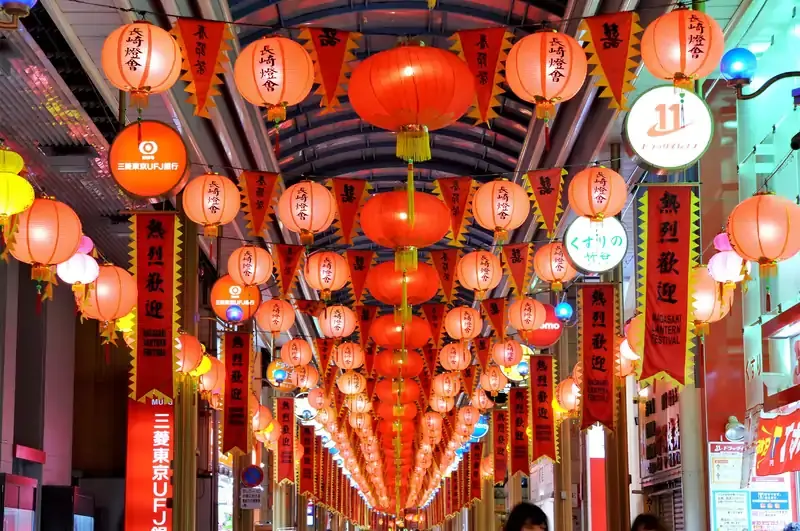
While not an official holiday, there are still events and festivals held across the Chinatowns in Japan to celebrate the Lunar New Year. One of the most notable events would be the Nagasaki Lantern Festival, which will light up on the first day of the Lunar New Year and last for 15 days. Apart from the display of numerous lanterns, there will be performances, stalls, and other activities that you would be able to enjoy during the festival.
Bonus Nomad Tip: If you're planning to visit Nagasaki Lantern Festival, here are a few tips:
- Book your accommodation in advance, as the city gets very busy during the festival.
- Get a Nomad data plan for Japan, so you won’t get burned by data roaming charges while you travel.
- Wear comfortable shoes, as you'll likely be doing a lot of walking to see all the lantern displays.
- Capture the beautiful lanterns and other decorations with a camera or your mobile phone.
- Try some traditional Japanese food, such as yakiniku (grilled meat) or _oden _(a type of hot pot).
- Have fun and immerse yourself in the festive atmosphere!
Overall, the Nagasaki Lantern Festival is a must-see event for anyone interested in Japanese culture and traditions. It's a great opportunity to experience the beauty and warmth of Nagasaki during the winter months.
Singapore
In Singapore, the Lunar New Year atmosphere is felt most strongly in the days leading up to the Lunar New Year. From supermarkets to Lunar New Year fairs held in malls, the local Chinese community would be busy stocking up on food and snacks to ensure there is enough to go around when friends and families visit over the holidays.
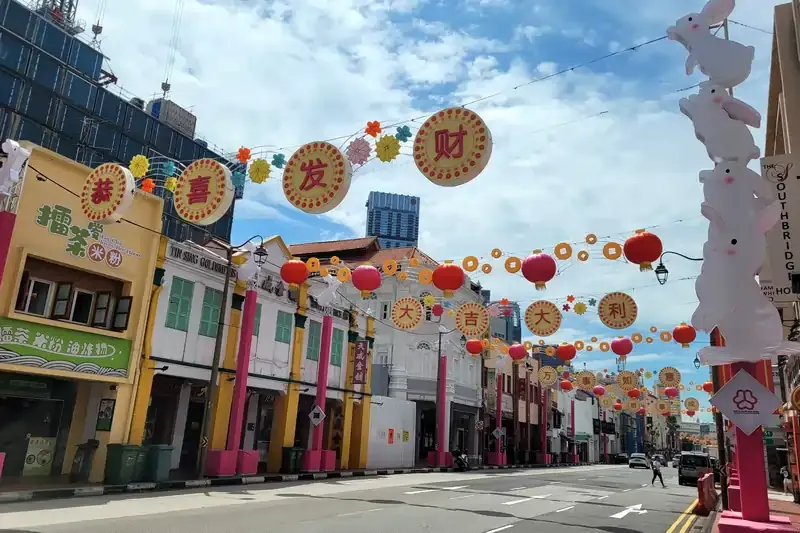
Businesses will typically have shortened hours on the eve of Lunar New Year so that families can prepare for their reunion dinner that night. Chinatown becomes exceptionally crowded after dinner as locals gather to catch a glimpse of the Lunar New Year countdown show and do some last-minute shopping.
On the morning of the first day of the Lunar New Year, temples would usually be really crowded as believers pray for blessings for the year ahead. Shops and restaurants are otherwise mostly closed on the first two days of the Lunar New Year, with some places closing for an additional few days. It will mostly be back to business as usual from the third day, but if you happen to be looking for a meal in Singapore over the first two days of the Lunar New Year holidays, fast food chains would likely be your best bet.
One of the most notable events during the Lunar New Year period in Singapore would be the annual** ****Chingay parade** which happens on the 3rd – 4th of February this year.
Nomad Tip: If you're planning to drive from Singapore to Malaysia during the Lunar New Year, be prepared for heavy traffic. Many families will be crossing the border and travelling home for the holidays, which can cause delays on the road. It's a good idea to plan your trip in advance and allow extra time for possible delays.
Korea
The seollal (Korean New Year) festival is one of the most important cultural festivals in Korea, and Koreans will take time off to return to their hometowns and families will gather for a reunion during seollal.
Similar to most other places in Asia, the festive mood is felt mostly on the days leading up to the actual day. Families will be rushing to prepare for the holidays, buying gifts for families and stocking up on foodstuffs to ensure they have enough to last throughout the holiday season.
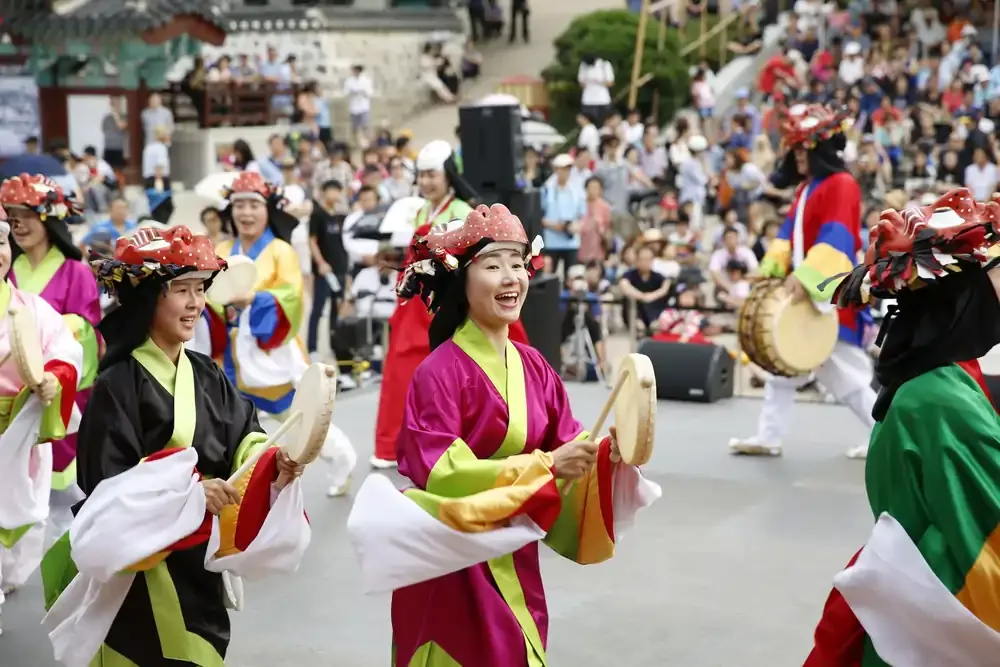
On the first day of seollal, the streets of Korea become very quiet, a very stark contrast from everyday Korea. Most local shops and restaurants will be closed for the holidays, with some of them closing a few days prior to the holidays, and only reopening a few days after.
Major tourist attractions would still be open and there would be special events that are held at these attractions to celebrate seollal, though opening hours would likely be adjusted. You should probably check out the official sites of these attractions before making your way down.
Nomad Tip: There will be a lot of intercity travelling as Koreans return to their hometowns. Train and bus tickets would be in high demand, so if you are planning to travel intercity during this period, be sure to book in advance!
Besides this, here are a more few tips:
- Learn about and respect local customs and traditions. Seollal is a time for family gatherings and traditional activities, such as playing traditional games and performing ancestral rituals.
- Try some traditional Korean food, such as tteokguk (a rice cake soup) and* ddeokguk *(a rice cake soup with dumplings). These dishes are considered good luck for the new year.
- Be prepared for cold weather, as Seollal takes place in the middle of winter. Pack warm clothing and layers to stay comfortable.
Seollal is a wonderful time to visit South Korea and learn about its rich culture and traditions. With a little planning and an open mind, you can have a truly memorable and meaningful holiday experience.
Vietnam
Tet (Vietnamese New Year) is a 6-day holiday in Vietnam. The Vietnamese zodiac is slightly different from its Asian counterparts, and this year, they are celebrating the year of the cat (while other countries are celebrating the year of the rabbit).
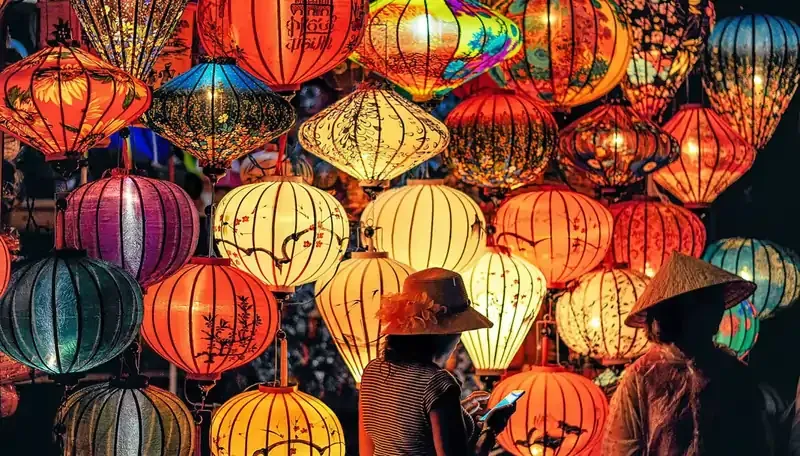
While most shops and attractions across the country would be closed during Tet, there are ways that you can still enjoy the festivities. On the night of Lunar New Year's Eve, there will be displays of fireworks at many places in Ho Chi Minh and Hanoi to welcome the New Year. In addition, you can also enjoy the display of flowers at the **Nguyen Hue Flower Festival **and Tao Ban Flower Festival in Ho Chi Minh.
To enjoy some festive activities, you can consider visiting Hoi An. Shops and restaurants will remain open, and the city becomes even more festive with cultural and art events throughout the week.
Nomad Tip: If you're planning to visit Hoi An during Tet, here are a few tips to make the most of your trip:
- Try some traditional Vietnamese food, such as banh chung (sticky rice cakes) and _banh tet _(cylindrical glutinous rice cakes). These dishes are traditional Tet treats.
- Be prepared for hot weather, as Tet takes place in the middle of the dry season. Pack light, breathable clothing and plenty of sunscreens.
- Take part in the local traditions and celebrations. Tet is a time for family gatherings, traditional lion dances, and fireworks displays.
Tet is an amazing time to visit Hoi An and experience the city's unique blend of Vietnamese and Chinese cultures. From trying traditional Tet treats and participating in local traditions to embracing the festive atmosphere, there are many ways to fully experience the culture and traditions of Tet in Hoi An.
Thailand
Unlike most of its neighbours, the Lunar New Year is not a public holiday in Thailand. That means shops and attractions are going to remain open, and you need not worry about visiting an empty street!
While not a public holiday, the Lunar New Year is still a largely celebrated event in Thailand. The Chinatown areas in Thailand would be decorated with lanterns and other elements fitting the Chinese New Year mood. Temples and shrines would see large crowds on the first day of the Lunar New Year, where people would pay their respects and pray for a good year ahead.
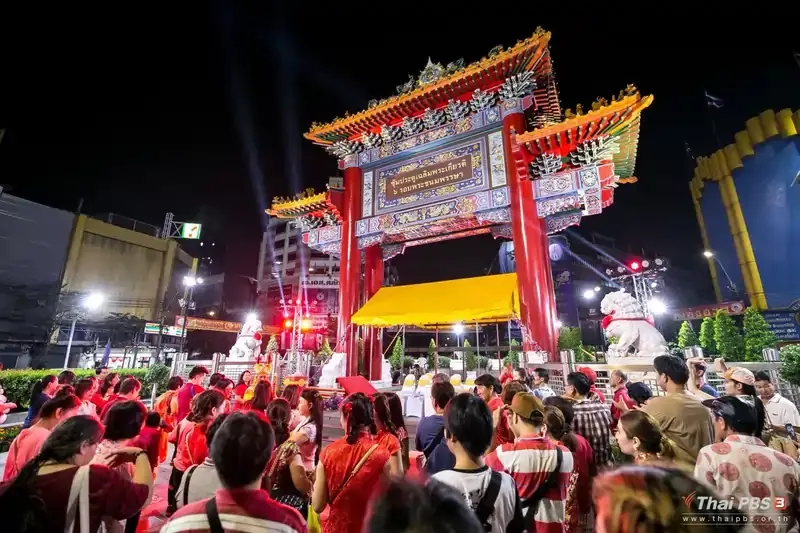
In Bangkok, the Odeon Gate at Yaowarat (Chinatown) is where most of the celebrations will take place, and you can expect to see performances like martial arts and lion dance.
Nomad Tip: If you're planning to spend the holiday in this vibrant and lively neighbourhood, here are a few ideas on how to make the most of your holiday Thailand trip:
- Explore the markets and shops in Chinatown, where you can find everything from traditional Chinese lanterns and decorations to exotic spices and herbs.
- Try some traditional Chinese and Thai food, such as roast pork, dumplings, and mango sticky rice. Many restaurants and street stalls in Chinatown offer special menus and deals for the holiday.
- Watch the colourful parades and performances, such as the dragon and lion dances. These are held throughout Chinatown during the holiday.
- Take part in traditional customs and activities, such as giving red envelopes filled with money as gifts and decorating your home with symbolic plants and flowers.
With its rich culture and traditions, delicious food, and lively atmosphere Odeon Gate is a great place to spend the Lunar New Year holiday.
Don't let data roaming charges dampen your Lunar New Year celebrations. Choose from our 15GB data plans for the countries mentioned above or our new SEA-Oceania regional plan if you're traveling to multiple countries!